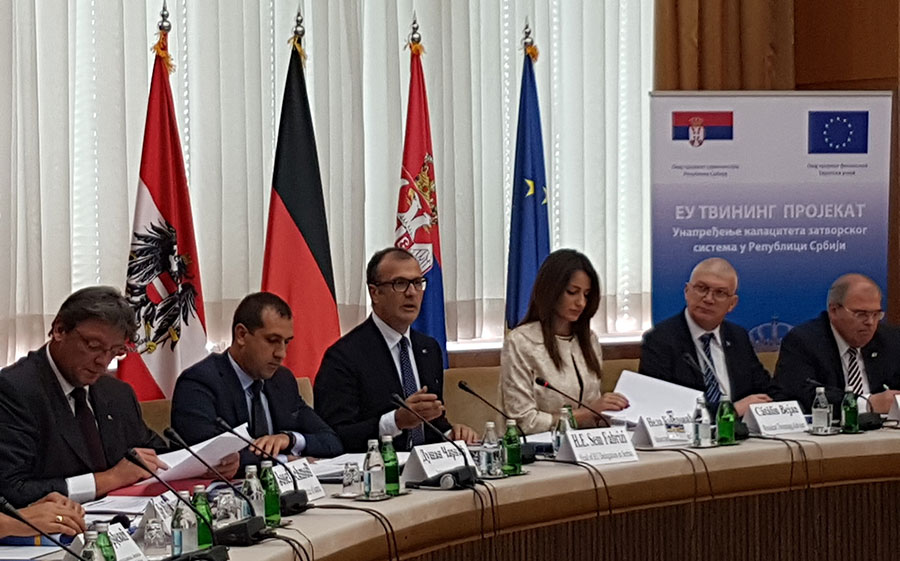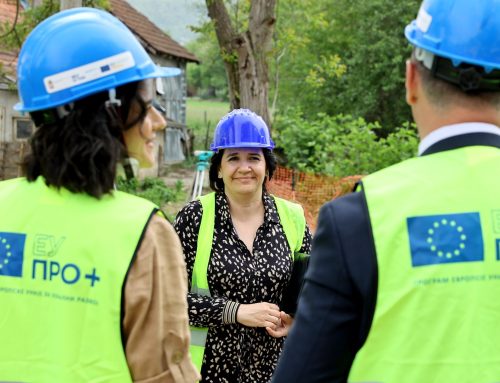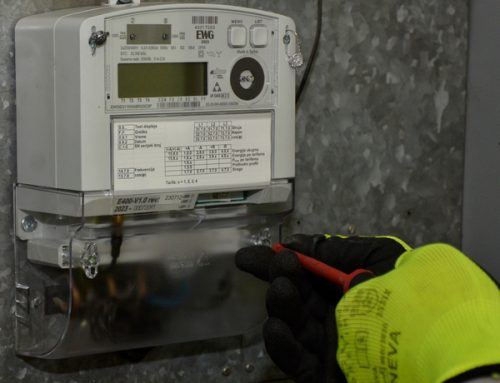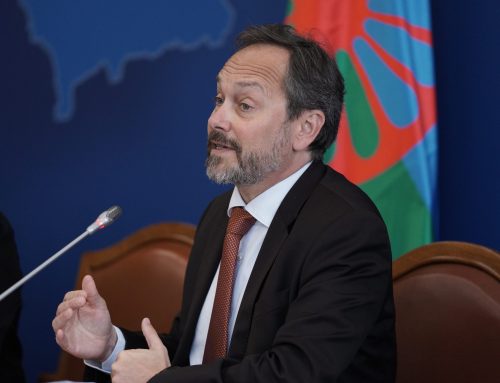The Ministry of Justice of the Republic of Serbia and the European Union launched today an eighteen-month Twinning project, implemented in partnership with Germany and Austria. The project, worth 1EUR million, aims at improving the prison system of the Republic of Serbia through the transfer of experience, expertise and good practice developed in EU Member States.
At the project launch ceremony, Head of the EU Delegation to Serbia Sem Fabrizi said that the project was essential to negotiating chapter 23, having in mind that the chapter 23 deals not only with justice and fundamental rights but covers a wider range of issues concerning the relationship between the state and its citizens.
“We support Serbia in making progress in this process and, in this regard, the EU will remain its biggest partner,” Fabrizi said.
He reminded that the EU allocated EUR23 million in support of Serbia’s efforts to open chapter 23 and another EUR7 million to support the reform of its prison system. “A country’s progress on the EU accession path is measured against the situation in the prison system as well,” Fabrizi stressed. Ambassador’s full speech is available here
Vice-Chancellor of Austria Wolfgang Brandstetter said that he was certain that the goal of the Twinning would be achieved given the vast importance of that area for the process of enforcement of penal sanctions.
“I am confident that the project will be a success and that it will bring valuable experience,” Brandstetter said.
Serbian Justice Minister Nela Kuburovic said that Serbia was no longer featured on the CoE “black list” and that it had moved up from the bottom of the CoE penal statistics. She said that “conditions in Serbian prisons have been significantly improved since 2010, and are now much better than in many wealthier EU Member States.” This is supported by the data indicating that in 2011, the population density in Serbian prisons was 157.6 per 100 places, whereas today the number stands at 106.4 inmates.
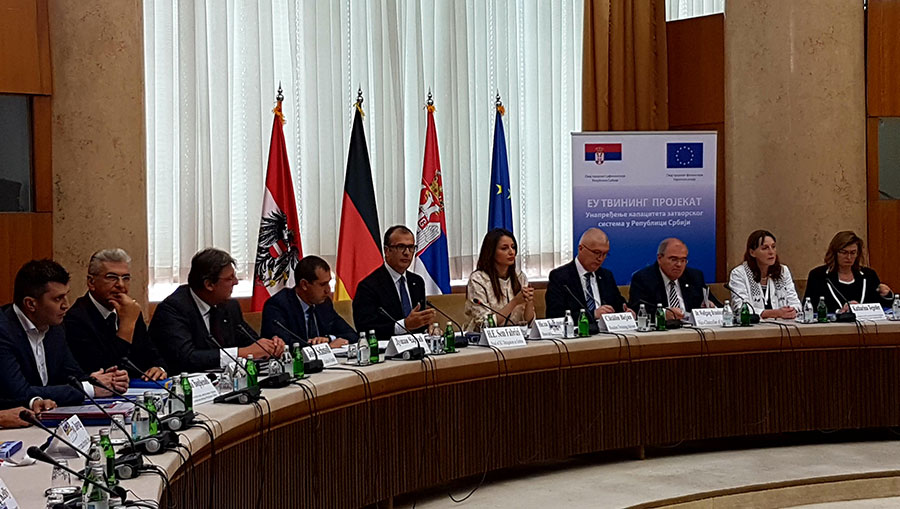 The Ministry of Justice of the Republic of Serbia continues to undertake activities with the aim to create a strategic framework for further reform of the judicial system, in line with EU standards. Accordingly, in 2013 a National Judicial Reform Strategy and the Penal Sanctions Enforcement System Development Strategy was adopted and should be implemented by 2020. The Strategies are in line with the Action Plan for Negotiating Chapter 23 (Justice and Fundamental Rights).
The Ministry of Justice of the Republic of Serbia continues to undertake activities with the aim to create a strategic framework for further reform of the judicial system, in line with EU standards. Accordingly, in 2013 a National Judicial Reform Strategy and the Penal Sanctions Enforcement System Development Strategy was adopted and should be implemented by 2020. The Strategies are in line with the Action Plan for Negotiating Chapter 23 (Justice and Fundamental Rights).
In accordance with the real need to continue to strengthen the capacity of the prison system in the Republic of Serbia, the Twinning Project is funded by the EU and designed to contribute to the professional development of prison staff by improving the quality of their education and training in order to strengthen the overall capacity of the Administration for Enforcement of Penal Sanctions.
Over the next 18 months, experts from the German Foundation for International Legal Cooperation in partnership with Austrian Agency for Economic Cooperation and Development will work closely with colleagues from the Administration for Enforcement of Penal Sanctions. A series of analysis, training seminars, workshops, study visits and meetings will be organised in order to improve the employability of convicts while also improving the living and working conditions in Serbian prisons.
More specifically, project experts will work to enhance organisational and technical capacity of the Centre for Training and Vocational Education of the Administration for Enforcement of Penal Sanctions in Nis which will help to prepare and deliver training programmes for the staff employed within the system of enforcement of criminal sanctions. A number of training sessions will be organised for the staff of the security service, treatment service and health service in the institutes for enforcement of criminal sanctions as well as vocational education of female inmates in the Penal Correctional Institute in Pozarevac.
The project is funded by the EU and co-funded by the Republic of Serbia. The beneficiary of the project is the Administration for Enforcement of Penal Sanctions of the Ministry of Justice, while the contracting authority on behalf of Serbia is the Department for Contracting and Financing of EU Funded Programmes.
The project is part of a larger EU support programme for penal reform in Serbia within which in the coming three years a total of EUR7 million will be provided to the national authorities to improve prison standards, health care in prisons and post release care. Also the support will be aimed at training of prison staff, as well as the procurement of vehicles for probation offices and tractors for prisons. The European Union is the largest donor to the Republic of Serbia, having provided over EUR3 billion in grants since 2000.
More about the Administration for Enforcement of Penal Sanctions
The Administration for Enforcement of Penal Sanctions is an institution under the Ministry of Justice of the Republic of Serbia tasked to organise, conduct and supervise enforcement of sentences of imprisonment, juvenile imprisonment, safety measures of mandatory psychiatric treatment and medical institution confinement as well as compulsory treatment of alcoholics and drug addicts and enforcement of correctional measures of referral to an educational-correctional facility and non-institutional sanctions and measures. The Administration enforces detention and other measure to ensure defendant’s presence in criminal proceedings. Also, the Administration monitors the status and application of regulations in the field of enforcement of penal sanctions and points to the need for and guides the development of legal regulations.
More about the Department for Contracting and Financing of EU Funded Programmes
The Department for Contracting and Financing of EU Funded Programmes (CFCU, Ministry of Finance) is responsible for payments, accounting, monitoring and reporting on the implementation of projects funded under the EU IPA pre-accession funds.

